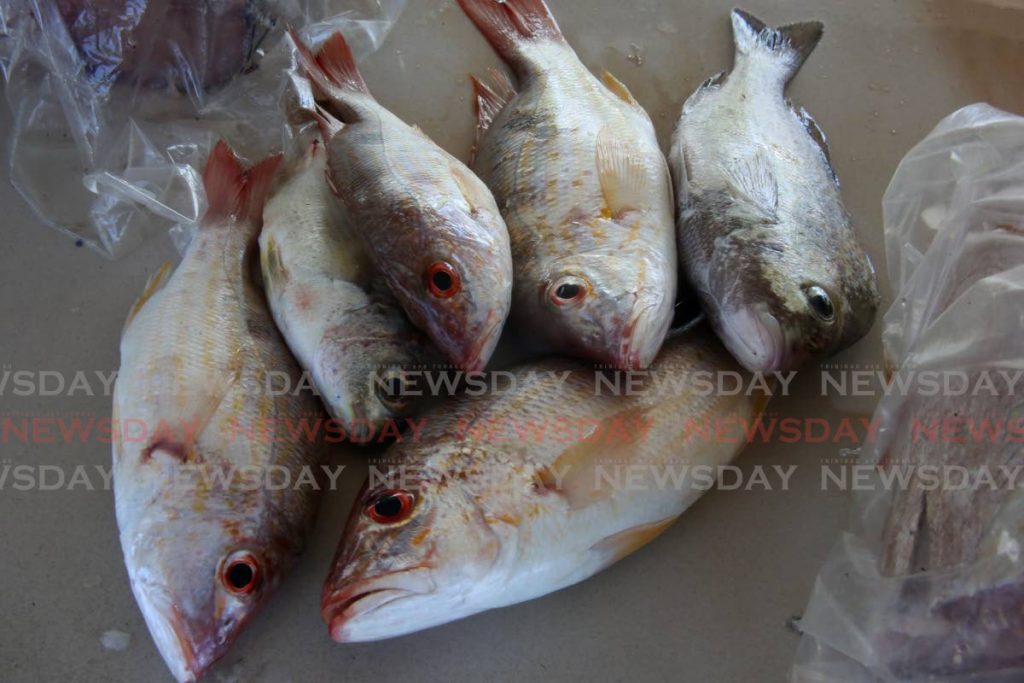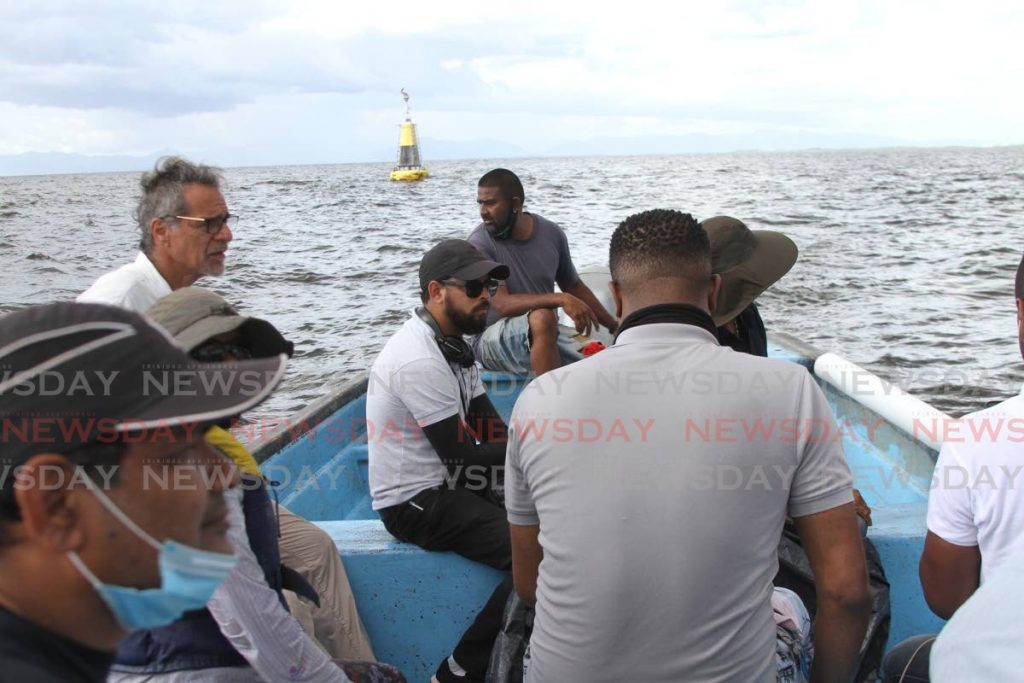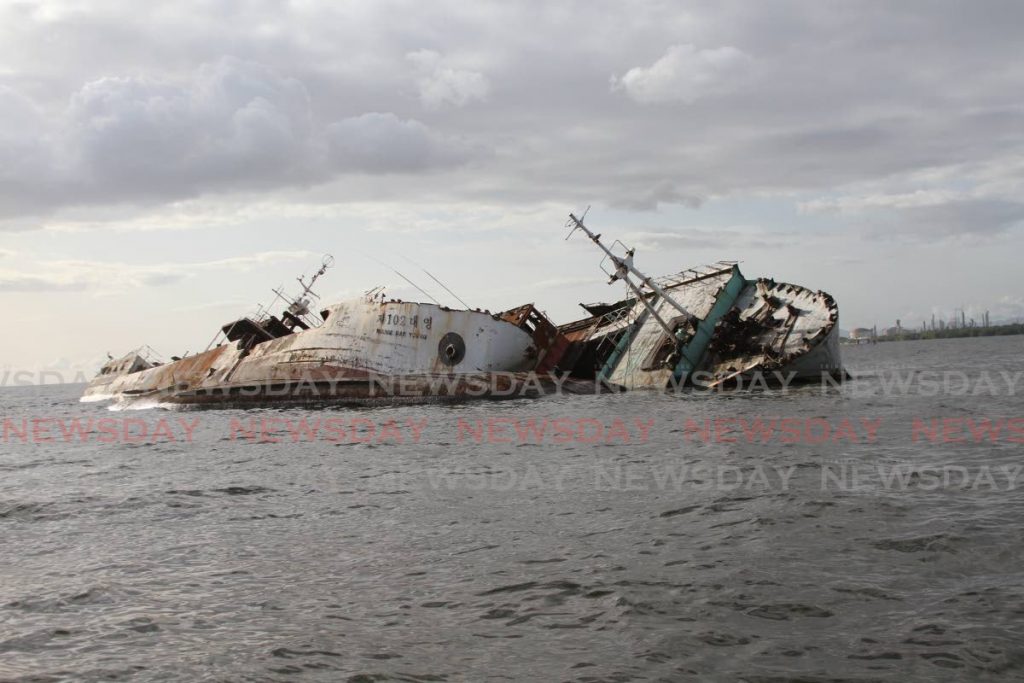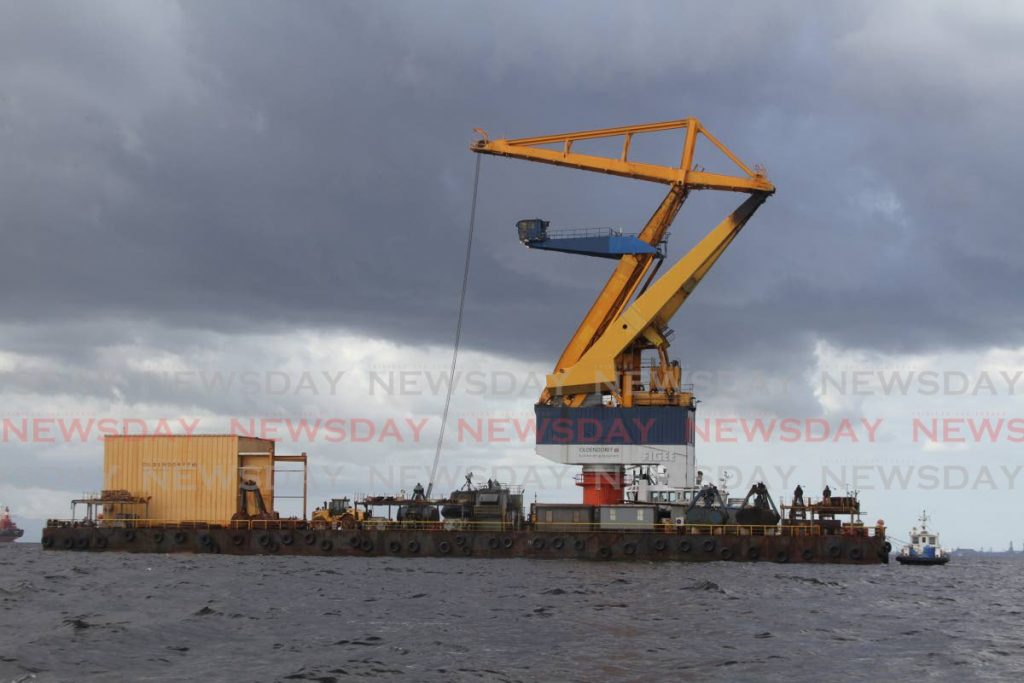Fishermen worry about impact of oil spill: Is the fish in the Gulf safe to eat?

Fishing communities along the western coast of Trinidad, from Orange Valley, Brickfield, Carli Bay, and others are again reeling from the fallout of the most recent oil spill in the Gulf of Paria and apart from losing costly drift nets, wholesale buyers are driving down their prices in one of their busiest harvest seasons.
Suresh Lall, better known as Dori Man, named after his pirogue, wants the Institute of Marine Affairs, the Environmental Management Authority (EMA) or any other relevant body to tell the public that fish caught in the Gulf is safe to eat.
Lall along with scores of other fishermen make their living from the sea and whenever pollutants spill into the Gulf buyers are sceptical.
He said right now there was a bounty of king fish, carite, cro cro, salmon which should be fetching wholesale prices of between $25 to $30 a pound but buyers at the Orange Valley Wholesale Market were offering between $12 to $15 a pound.
Lall said apart from pirates, who have killed nine fishermen in the Gulf within recent times, the majority of fisherfolk have to spend the night at sea and return after the curfew expires at 5 am, a promise to help get them flare guns has not materialised, and the high cost of living are among the problems they face.
On Thursday, he opted to catch crabs in the mangrove because fish was scarce.
Last week, Paria Fuel Trading Company said it discovered the spill about 7.30 pm on Saturday along a 12-inch crude pipeline.

After videos were shared on social media by environmental activist group, Fishermen and Friends of the Sea (FFOS), the company issued a statement which said: “The spill is contained, and a residual clean-up is ongoing.”
According to the company absorbent booms had been strategically placed to capture the oil, and that vacuum trucks were removing oil collected on land while oil streaks at sea were being “mechanically broken up.”
Fisherman Deonarine Ramroop, also known as Pell, was captaining the vessel with activists from FFOS when he said he narrowly managed to move out of the way as two tugs employed by the company were trying to dissipate the carpet of oil by driving through at high speed.
On Wednesday, Sunday Newsday and other media personnel went out at sea with Lisa Premchand and Gary Aboud of FFOS, and Imtiaz Khan, president of the Carli Bay Fishing Association, to see first-hand the trail of damage left in the ocean, marine life and vessels.
Khan said in 2018 when the oil cap blew off Orange Valley fisherfolk were advised to stay off the water for an entire month. He said the Gulf was home to a significant number of nurseries for the fish stock and if hydrocarbons are not disposed of following the correct protocols the future of the fish industry will be in jeopardy.
He said once the Gulf was contaminated by oil fish tend to relocate and fishermen must travel to the north coast to ply their trade which increases their overhead with higher fuel costs.
"We need it to be dealt with better than the last time."
He said fishing communities as far as Fullarton, Cedros to Carenage can be affected whenever there is an oil spill in the Gulf. Aboud said as many as 50,000 people who work in various sectors of the industry were affected whenever there is an oil spill. He pleaded with the EMA to invoke the Water Pollution Rules and hold those culpable to pay for their wrongdoing and also called on Paria Fuel, the Ministry of Energy and Ministry of Agriculture and Fisheries to reach out to the affected fisherfolk to offer some form of compensation.
By that time most of the oil had already sunk to the ocean floor but there was evidence of strong hydrocarbon fumes as the team got closer to the Pointe-a-Pierre jetty of Paria Fuel. Some pelicans were oil stained but there was no evidence of any fish kill or large globs of oil still floating in the Gulf. There were no signs of any booms and drone footage did not spot any.
After almost five hours of travelling as far out as nine miles from shore and between Carli Bay to Pointe-a-Pierre the search party called it day. On shore, fishermen were counting their losses.
Shipwrecks litter the Gulf
The Gulf of Paria is the main thoroughfare for LNG tankers, shipping lines using the Plipdeco Port, Trinidad Cement Ltd jetty, the Pointe-a-Pierre refinery, where fuel is off-loaded, and is also the channel used by tankers transporting bauxite from Guyana.
It is littered by derelict ships, many of them partially submerged, scorched from scrap iron looters, and pose dangers to unsuspecting vessels unfamiliar with the wrecks. The main Couva Bouy was not lit as it approached dusk and has been so for many months.

Most of the fishermen in the Gulf use drift nets which can stretch for as long as three miles. They said once it is contaminated with oil it cannot be cleaned or it weakens and can further contaminate their catch. The average cost to replace a drift net is over $40,000, they said.
Ramroop pleaded with the offending company to meet with the affected fisherfolk to pay some sort of compensation to help replace his net and clean his fishing vessel.
"My boat completely messed up. It was about five inches of oil I had to pass through. Right now, my engine down and oil leaking out of it," he said.
Like Ramroop many of the other fishermen do not have any alternative form of income.
Ramroop, who has been fishing for the last 32 years, says he had to make a hustle on another's man boat to put a meal on his table.
"We are poor fishermen, why can't they come forward to help up get back in the sea."
In 2018, Ramroop and several other fishermen suffered a similar fate when a well cap blew in the Gulf in an area they refer to as the Christmas Tree, because of decoration placed on a submerged vessel.
Negotiations to provide compensation to those fishermen are yet to be completed.
Agriculture Minister Clarence Rambharat said the issue of compensation was a matter which fell under the remit of the EMA, the polluter and the Ministry of Energy and Energy Industries.
"When called upon the (ministry's) Fisheries Division advises on the claims being made to the polluter."
He said the outstanding 2018 claims was a matter between the Energy Ministry and the fisherfolk. Energy Minister Stuart Young did not acknowledge a query on the issue.

In response to queries, the EMA said, "based on field observations and ongoing investigations the spill occurred on 07 August 2021 in the vicinity of the mouth of the Guaracara River. The source of the spill emanated from a crude oil pipeline which has since been clamped by Paria Fuel Trading Co Ltd. Aerial, sea and land surveillance are ongoing and continuous assessments are being conducted to address the spill incident."
Asked whether there is any cause for concern about the safety of fish caught in the Gulf, the EMA said there has been no evidence of any major fish kills associated with the oil spill and further assessments will have to be done to better inform on the quality of fish. The statement was issued through the Ministry of Planning and Development.


Comments
"Fishermen worry about impact of oil spill: Is the fish in the Gulf safe to eat?"